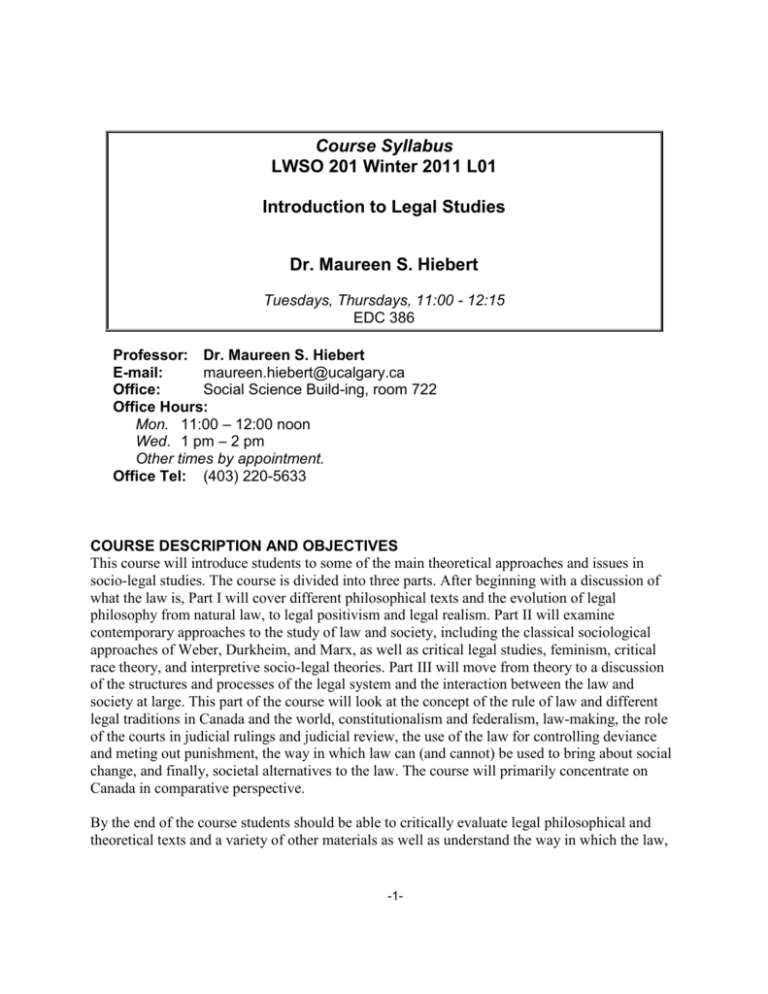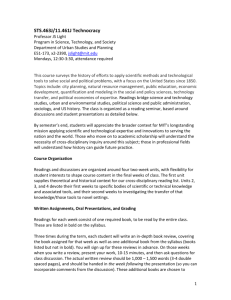
Course Syllabus
LWSO 201 Winter 2011 L01
Introduction to Legal Studies
Dr. Maureen S. Hiebert
Tuesdays, Thursdays, 11:00 - 12:15
EDC 386
Professor: Dr. Maureen S. Hiebert
E-mail:
maureen.hiebert@ucalgary.ca
Office:
Social Science Build-ing, room 722
Office Hours:
Mon. 11:00 – 12:00 noon
Wed. 1 pm – 2 pm
Other times by appointment.
Office Tel: (403) 220-5633
COURSE DESCRIPTION AND OBJECTIVES
This course will introduce students to some of the main theoretical approaches and issues in
socio-legal studies. The course is divided into three parts. After beginning with a discussion of
what the law is, Part I will cover different philosophical texts and the evolution of legal
philosophy from natural law, to legal positivism and legal realism. Part II will examine
contemporary approaches to the study of law and society, including the classical sociological
approaches of Weber, Durkheim, and Marx, as well as critical legal studies, feminism, critical
race theory, and interpretive socio-legal theories. Part III will move from theory to a discussion
of the structures and processes of the legal system and the interaction between the law and
society at large. This part of the course will look at the concept of the rule of law and different
legal traditions in Canada and the world, constitutionalism and federalism, law-making, the role
of the courts in judicial rulings and judicial review, the use of the law for controlling deviance
and meting out punishment, the way in which law can (and cannot) be used to bring about social
change, and finally, societal alternatives to the law. The course will primarily concentrate on
Canada in comparative perspective.
By the end of the course students should be able to critically evaluate legal philosophical and
theoretical texts and a variety of other materials as well as understand the way in which the law,
-1-
LWSO 203 F10 L01
Course Syllabus
Dr. Maureen S. Hiebert
_____________________________________________________________________
politics, and society influence each other and how the law in Canada and other liberal
democracies is made and reformed over time.
READINGS AND REQUIRED TEXTS
Steven Vago and Adie Nelson, Law and Society (Third Canadian Edition) (Toronto: Pearson
Prentice Hall, 2009)
Kazmierski, Dickson-Gilmore, Kuzmarov, Moore, Tasson (Eds.)(Carleton Department of Law
Casebook Group), Introduction to Legal Studies, (Fourth Edition) (Captus Press, 2010).
Readings not from the textbooks will be posted on the course Blackboard
website
REQUIREMENTS
Mid-term test: Week 6 Tuesday, February 15, 2011 (25% of final grade)
The mid-term will be a multiple choice test. The test will be on material covered up until
the class before the mid-term.
Assignment: Week 12 Tuesday, April 5, 2011 (35% of final grade)
The assignment will involve collecting “artifacts” that represent different aspects of the
law covered in the course. More information will be available on an assignment sheet
posted on the Blackboard website for the course.
Final Exam: exam period (40% of final grade)
The final exam will consist of multiple choice and long answer essay style questions.
The final exam will be cumulative (i.e. it will cover all 13 weeks of the course) and will
test the student on materials covered in lectures and readings.
Final grades will be calculated based on the marks accumulated by students on each of
the course requirements. Students do not need to pass each requirement to pass the
course.
Registrar-scheduled Final Examination: Yes
Policy for Late Assignment
Assignments submitted after the deadline will be penalized with the loss of a grade
(e.g. A- to B+) for each day late.
-2-
LWSO 203 F10 L01
Course Syllabus
Dr. Maureen S. Hiebert
_____________________________________________________________________
GRADING SCALE
A+
96–100
B+
80–84.99
C+
65–69.99
D+
53–54.99
A
90-95.99
B
75–79.99
C
60–64.99
D
50–52.99
A–
85–89.99
B–
70–74.99
C–
55–59.99
F
0–49
SCHEDULE OF Lectures and Readings
The following topics and readings will be covered, time permitting
Part I Legal Theory and Philosopy
Week 1: What is Law; Natural Law
January 11, 13
Readings:
Kazmierski et al. “The Function of Law”
Thucydides, “Melian Dialogue”, History of the Peloponnesian War, 5.84-116
Plato, Crito
Aristotle, selections from The Nicomachean Ethics and The Politics
WEEK 2: NATURAL LAW AND LEGAL POSITIVISM
January 18, 20
Readings:
St. Thomas Aquinas, Summa Theologiae, Q. 90 The Essence of Law, Q. 94 The Natural Law, Q.
95 Human Law
Thomas Hobbes, Leviathan, Part I chapter 13, chapter 14 par. 1-5, Part II chapter 17 par. 1-5
Edmund Burke, selections from Reflections
WEEK 3: LEGAL POSITIVISM AND LEGAL REALISM
January 25, 27
Readings:
Kazmierski et al. chapter 5 Law, Morality, Justice (all readings)
Jeffrie G. Murphy and Jules L. Coleman, Philosophy of Law: An Introduction to Jurisprudence
(Revised Edition), chapter 1, pp. 19-50
-3-
LWSO 203 F10 L01
Course Syllabus
Dr. Maureen S. Hiebert
_____________________________________________________________________
PART II: LAW AND SOCIAL THEORY
Week 4: Classical Socio-legal Theory
February 1, 3
Readings:
Vago and Nelson, chapter 2, pp. 31- top of 46
WEEK 5: MARX AND CRITICAL LEGAL THEORY
February 8, 10
Readings:
Vago and Nelson, chapter 2, pp. 46 - top 49
Kazmierski et al., chapter 12, “Law, State, and Class Struggle”
WEEK 6: MID-TERM TEST AND FEMINISM AND RACE-BASED CRITICAL
THEORY
February 15 Mid-term test in-class
February 17
Readings:
Vago and Nelson, chapter 2, pp. 49-54
Kazmierski et al., chapter 12, “Understanding Over-representation Commission on Systemic
Racism in the Ontario Criminal Justice System”
READING WEEK FEBRUARY 20-27
WEEK 7: INTERPRETIVE THEORY
March 1, 3
Readings:
Max Travers, “Symbolic Interactionism and Law”, Introduction to Law and Social Theory (Reza
Banakar and Max Travers eds.) (Hart Publishing, 2002), pp. 209-226
PART III STRUCTURES AND PROCESS: LAW, POLITICS, AND SOCIETY
week 8: Rule of Law and the Common and Civil Law Traditions
March 8, 10
Readings:
Vago and Nelson, chapter 1, pp. 1-24
Kazmierski et al., chapter 8 Judicial Decisions and the Common Law (all readings)
-4-
LWSO 203 F10 L01
Course Syllabus
Dr. Maureen S. Hiebert
_____________________________________________________________________
WEEK 9: CONSTITUTIONALISM, FEDERALISM, AND LAW-MAKING
March 15, 17
Readings:
Vago and Nelson, chapter 4, pp. 118-136
Kazmierski et al., chapter 3, Constitutional Context: Law, the State, and the Constitution
(all readings)
WEEK 10: THE COURTS: JUDICIAL OPINION AND JUDICIAL REVIEW
March 22, 24
Readings:
Vago and Nelson, chapter 3, pp. 59-top 85
Kazmierski et al., chapter 24, “The Meaning and Scope of Judicial Independence”;
“Should Judges Hold Their Tongues?”
WEEK 11: DEVIANCE AND CONTROL: LAW, CRIME, AND PUNISHMENT
March 29, 31
Readings:
Vago and Nelson, chapter 5 (all)
WEEK 12: LAW AND SOCIAL CHANGE
April 5, 7
April 5, Assignments due in class
Readings:
Vago and Nelson, chapter 7 (all)
WEEK 13: CATCH-UP AND REVIEW
April 12, 14
REGULATIONS
Writing:
Law and Society courses often include essay
assignments.
In
cases
where
such
assignments are made, the quality of the
writing, including presentation and grammar,
may affect the grade.
-5-
LWSO 203 F10 L01
Course Syllabus
Dr. Maureen S. Hiebert
_____________________________________________________________________
See E.2 Writing Across the Curriculum
statement.
Academic Accommodation:
With regard to the University’s Academic
Accommodation
Policy,
the
Disability
Resource Centre advises as follows: “It is the
student’s responsibility to request academic
accommodations. If you are a student with a
documented disability who may require
academic accommodation and have not
registered with the Disability Resource Centre,
please contact their office at 403 220-8237.
Students who have not registered with the
Disability Resource Centre are not eligible for
formal academic accommodation. You are
also required to discuss your needs with your
instructor no later than fourteen (14) days
after the start of this course.”
Academic Honesty:
Academic honesty is the cornerstone in the
development of knowledge. A single offence
of cheating, plagiarism or other academic
misconduct on term work, tests or final
examinations or assignments can lead to
disciplinary
probation,
suspension
or
expulsion from the faculty by the dean. If a
student allows his/her name to stand on group
work when in fact there is essentially no
contribution made, then that student is guilty
of academic misconduct. Please refer to the
current University Calendar for further details.
Plagiarism:
Using any source whatsoever without clearly
documenting it is a serious academic offence.
See 2010-2011 Calendar, section K.2
(Plagiarism/Cheating/Other
Academic
Misconduct).
Consequences include failure on the
assignment, failure in the course and possibly
suspension or expulsion from the university.
You must document not only direct quotations,
but also paraphrases and ideas where they
appear in your text. A reference list at the end
is insufficient by itself. Readers must be able
to tell exactly where your words and ideas end
and other people’s words and ideas begin.
Please consult your instructor or the Writing
Centre (SS 110) if you have any questions
regarding proper documentation of sources.
PLEASE READ THE FOIP MESSAGE
BELOW REGARDING THE RETURN OF
PAPERS, ESSAYS, ETC.
The FOIP Freedom of Information and
Protection of Privacy legislation disallows the
practice
of
having
students
retrieve
assignments from a public place e.g., outside
instructor’s office, the department office, etc.
Term assignments must be returned to
students individually, during class OR during
the instructor's office hours; if students are
unable to pick up their assignments from the
instructor, they may provide the instructor with
a stamped, self-addressed envelope to be
used for the return of the assignment.
Assignments are not available in the General
Office.
Examinations — Department Policy:
Regulations regarding final examinations can
be found in Section G. (Examinations and
Tests) of the Calendar. Students will submit
their
application
and
supporting
documentation to Enrolment Services, MLB
117 for approval.
Permission
to
reschedule
midterm
examinations, quizzes, and tests is normally
given only in cases of illness, domestic
affliction, or religious conviction. In such
circumstances, you should inform the
instructor as soon as possible and supply
appropriate documentation. In the case of a
missed midterm examination, quiz, or test,
you must contact the instructor within 48
hours.
Students’ Union Information:
Vice-President Academic:
tel: 403 220-3911
email: suvpaca@ucalgary.ca
ARTS Faculty Representative:
tel: 220-6551
rm: MSC 251
-6-
LWSO 203 F10 L01
Course Syllabus
Dr. Maureen S. Hiebert
_____________________________________________________________________
Laura Golebiowski:
email: arts1@su.ucalgary.ca
Bhuvana Sankaranarayanan:
email: arts2@su.ucalgary.ca
Lara Schmitz:
email: arts3@su.ucalgary.ca
Vincent St. Pierre:
email: arts4@su.ucalgary.ca
Graduate Representative
Student Ombudsman’s Office
SAFEWALK: Campus Security
Tel: 403 220-5333
Emergency
Points
Evacuation
and
Assembly
Please note the evacuation points for this
particular classroom. All classrooms on
campus exit to specific places in case of
emergency. The emergency assembly
points differ depending upon where your
classroom is located. For information on the
emergency evacuation procedures and the
assembly points
see:
http://www.ucalgary.ca/emergencyplan/assem
blypoints"
-7-








